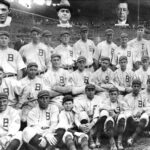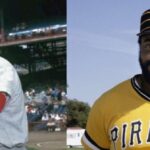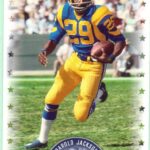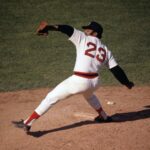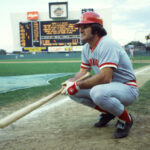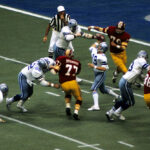Baseball Hall of Fame Gets It Right and Wrong
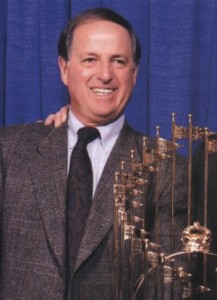
Pat Gillick in the first pure general manager from the last 50 years of baseball to be selected for the Baseball Hall of Fame.
The election earlier this week of Pat Gillick to the Baseball Hall of Fame was a deserving honor for a longtime baseball executive, but the Veterans Committee missed a chance to make the 2011 Hall of Fame class truly special.
Recognizing baseball front office personnel who were not owners or league officials is not one of the traditional strengths of the Baseball Hall of Fame. Gillick is the 32nd baseball executive honored by the Hall of Fame, but only the fourth whose primary responsibilities was as a general manager or team architect and the only one from the last 50 years of baseball.
While other general managers have received more publicity, few in the modern era of baseball have had more success than Gillick.
After beginning his career with the fledgling Houston Astros and then having a stint in the front office of the New York Yankees in the 1970s, it was after joining the expansion Toronto Blue Jays that Gillick began establishing his Hall of Fame credentials.
Originally hired in 1976 as the Vice President of Player Personnel, in 1977 he became Vice President of Baseball Operations and in 1984 named the Executive Vice President of Baseball Operations.
Overseeing the development of the roster from expansion, Gillick crafted a roster that was built through the development of minor leaguers and then enhanced with savvy veteran acquisitions.
The Blue Jays posted their first winning record during their seventh season (1983) and two years later won 99 games and reached the AL Championship Series for the first time. They also won the AL East in 1989 and 1991 before claiming back-to-back World Series titles in 1992 and 1993. He left the organization in 1994 and the franchise has not reached the post season since.
In 1995 Gillick became general manager of the Baltimore Orioles and in 1996 and 1997 the team reached the AL Championship Series. The Orioles have not had a winning season since his departure in 1998.
Gillick then joined the Seattle Mariners and helped the team navigate through a challenging period during which he traded superstar Ken Griffey Jr. and allowed Alex Rodriguez to sign with the Texas Rangers as a free agent.
The Mariners earned back-to-back playoff appearances for the only time in team history during the 2000 and 2001 seasons. In 2001 they matched the all-time record for wins in a season with 166. However, they were unable to parlay that success into a championship.
As was the case in Toronto and Baltimore, the Mariners have yet to return to the post season since Gillick’s departure.
In November 2005 he became general manager of the Philadelphia Phillies, a team that had not reached the playoffs since 1993.
After finishing second during his first year at the helm, Philadelphia reached the playoffs in 2007 and in 2008 won the World Series for the first time since 1980.
Gillick retired after leading the Phillies to the World Series title, but unlike in his previous stops the squad has been able to maintain success after his departure. Philadelphia lost the World Series in 2009 to the New York Yankees and reached the NL Championship Series in 2010.
While the Veterans Committee deservedly selected Gillick for Hall of Fame recognition, the committee didn’t get everything right. Their omission of former players’ association head Marvin Miller and longtime New York Yankees owner George Steinbrenner proves that the Hall of Fame isn’t all about recognizing contributions to baseball.
The omission of Miller is particularly disappointing as the 93-year-old is as responsible for the financial success of the sport over the last 40 years as anyone in the game, yet because he was the thorn in the side of the owners for two decades he now is unlikely to receive his deserved recognition during his lifetime. In his fifth time on the Veterans Committee ballot, Miller received 11 votes when 12 were needed for induction.
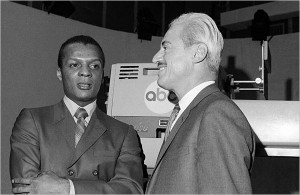
Curt Flood and Marvin Miller (right) forever changed the way players were treated by teams, but neither will likely ever be recognized in the Baseball Hall of Fame.
In a statement released after his snub, Miller gave a great capsule of why he will never be allowed into the Hall of Fame during lifetime and possibly never.
“Many years ago those who control the Hall decided to rewrite history instead of recording it. The aim was to eradicate the history of the tremendous impact of the players’ union on the progress and development of the game as a competitive sport, as entertainment, and as an industry.”
Having passed away earlier this year it was already known that Steinbrenner’s potential induction would be posthumous, but regardless, it seems unfair that he didn’t even receive as many as eight votes from the committee.
There is no question that Steinbrenner’s tenure as owner of the Yankees was filled with controversy and even a ban from baseball, but it is difficult to argue with his success or commitment to the game.
After purchasing the team in 1973, Steinbrenner led them to four World Series appearances and two titles between 1976 and 1981. After struggling over the next decade, in 1995 the Yankees began a run in 1995 that has seen the franchise win five World Series and reach the post season in all but one seasons over the last 16 years.
Amongst the players on the ballot who played most of their career in the 1970s and 1980s, only former Cincinnati Reds shortstop Dave Concepcion (8 votes) was seriously considered. Considering his position and important role on the Big Red Machine, I think an argument can be made for Concepcion as a Hall of Famer. But in my opinion he is not as deserving of consideration as Gil Hodges or Ron Santo, neither of whom have been inducted (neither player was part of this selection and will be considered with others from their era next year).
Compared to the Football Hall of Fame, baseball has done a pretty good job making sure that the most deserving players, coaches and executives receive the sport’s highest honor. However, there are still some holes and it is disappointing that they didn’t take advantage of the chance to rectify that this year.
Hopefully they will do a little better job next year when Santo and Hodges come up for consideration.
